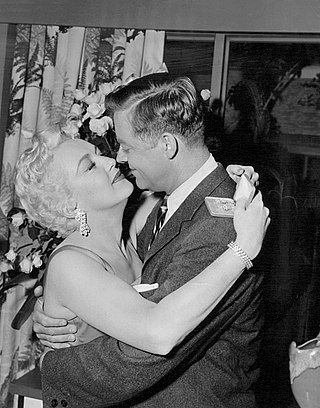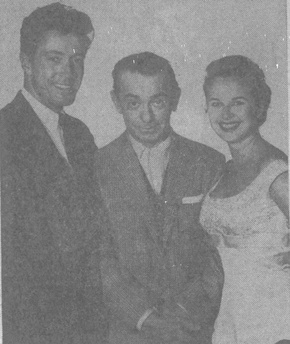
Armstrong Circle Theatre is an American anthology drama television series which ran from June 6, 1950, to June 25, 1957, on NBC, and from October 2, 1957, to August 28, 1963, on CBS. It alternated weekly with The U.S. Steel Hour. It finished in the Nielsen ratings at number 19 for the 1950–51 season and number 24 for 1951–52. The principal sponsor was Armstrong World Industries.

Climax! is an American television anthology series that aired on CBS from 1954 to 1958. The series was hosted by William Lundigan and later co-hosted by Mary Costa. It was one of the few CBS programs of that era to be broadcast in color, using the massive TK-40A color cameras pioneered and manufactured by RCA, and used primarily by CBS's rival network, NBC. Many of the episodes were performed and broadcast live, but, although the series was transmitted in color, only black-and-white kinescope copies of some episodes survive to the present day. The series finished at #22 in the Nielsen ratings for the 1955–1956 season and #26 for 1956–1957.

Lux Video Theatre is an American television anthology series that was produced from 1950 until 1957. The series presented both comedy and drama in original teleplays, as well as abridged adaptations of films and plays.
Goodyear Television Playhouse is an American anthology series that was telecast live on NBC from 1951 to 1957 during the first Golden Age of Television.

Playwrights '56, a.k.a. The Playwright Hour, is a 60-minute live American dramatic anthology series produced by Fred Coe for Showtime Productions. Twenty episodes aired on NBC from October 4, 1955, to June 19, 1956. It shared a Thursday time slot with Armstrong Circle Theatre.

Star Stage is a half-hour American television anthology series that began on September 9, 1955, and ended on September 7, 1956.
"The Hidden Image" was an American television play broadcast live on November 12, 1959, as part of the CBS television series, Playhouse 90. It was the fourth episode of the fourth season of Playhouse 90 and the 121st episode overall.
"The Silver Whistle" was an American television play broadcast live on December 24, 1959, as part of the CBS television series, Playhouse 90. It was the seventh episode of the fourth season of Playhouse 90 and the 124th episode overall.
"Sincerely, Willis Wayde" was an American television play broadcast on December 13, 1956, as part of the CBS television series, Playhouse 90. It was the 11th episode of the first season of Playhouse 90.
"The Big Slide" was an American television play broadcast on November 8, 1956, as part of the CBS television series, Playhouse 90. It was the sixth episode of the first season of Playhouse 90. Red Skelton and Shirley Jones starred in the play about a silent movie star. Skelton was nominated for a Primetime Emmy Award for best performance by an actor. Martin Manulis was the producer, and Ralph Nelson was the director.

"A Town Has Turned to Dust" is an American television play broadcast live on June 19, 1958, as part of the second season of the CBS television series Playhouse 90. Rod Serling wrote the teleplay, and John Frankenheimer directed. Rod Steiger and William Shatner starred.

"Helen Morgan" is an American television play broadcast on May 16, 1957, as part of the CBS television series, Playhouse 90. It was the 33rd episode of the first season of Playhouse 90.

"Sizeman and Son" was an American television play broadcast on October 18, 1956, as part of the CBS television series, Playhouse 90.

"Eloise" was an American television play broadcast on November 22, 1956, as part of the CBS television series, Playhouse 90. It was the eighth episode of the series.

"The Fabulous Irishman" was an American television play broadcast live on June 27, 1957, as part of the CBS television series, Playhouse 90. It was the 39th episode of the first season.

"The Family Nobody Wanted" was an American television play broadcast on December 20, 1956, as part of the CBS television series, Playhouse 90. It was the 12th episode of the first season of Playhouse 90.

"The Defender" is an American television play broadcast live in two parts on February 25, 1957, and March 4, 1957, as part of the CBS television series Studio One. A courtroom drama, it was written by Reginald Rose and directed by Robert Mulligan. The cast included Ralph Bellamy and William Shatner as a father-son defense team, Steve McQueen as the defendant, and Martin Balsam as the prosecutor. Rose later spun off the concept into a full series entitled The Defenders, starring E.G. Marshall and Robert Reed in Bellamy and Shatner's roles.

"The Return of Ansel Gibbs" was an American television play broadcast on November 27, 1958, as part of the CBS television series, Playhouse 90.

"Face of a Hero" is an American television play broadcast on January 1, 1959 as part of the CBS television series, Playhouse 90. John Frankenheimer was the director and John Houseman the producer. The cast included Jack Lemmon and Rip Torn.

Life with Father is an American television sitcom that ran from 1953 to 1955. It starred Leon Ames as Clarence Day Sr. and Lurene Tuttle as his wife Lavinia. It began broadcasting in color in 1954, and was the first live color TV series for network television originating in Hollywood.















